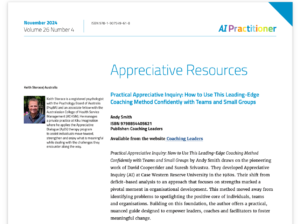How to Instantly Improve The Coaching Relationship

[ad_1]

(this article follows on from the previous Appreciative Coaching: Why We Assume That Something Is Working For Every Client, so you might want to read that first)
Let’s take a closer look at how the assumptions we hold going into a coaching session influence the likely outcome – in particular, the assumption that ‘In every client’s situation, there is something working.’
Our assumptions influence how we view the coachee, and consequently how we speak and behave towards them, on every level – from the words we choose, to the tone of voice and body language we bring to the conversation, and the even how much attention we pay to them and how motivated we are to do our best for them.
When I trained in Neuro-Linguistic Programming (NLP) some decades ago, we were taught to presuppose that ‘everyone has all the resources they need to make the changes they want’, and that ‘there are no unresourceful people – only unresourceful states’ (that they get into sometimes). While it wasn’t claimed that these presuppositions were always true, it was held that we needed to act as if they were true in order for NLP interventions to be successful.
The assumption that there’s something working in every coachee’s situation is similar in its intent and its effects. Imagine how differently a coaching session would go if we went in with the assumption that ‘there’s something wrong with this person’, or ‘they may or may not have the ability to improve their lives.’
This would affect every aspect of the way we interact with the coachee – both consciously, in the kind of questions we choose to ask, and unconsciously, in our non-verbal communication. This is something that the coachee can’t help but pick up on – again, perhaps consciously, but definitely unconsciously.
The content and tone of our questions, along with our general demeanour, will affect how the coachee feels about you (the coach), and their guesses about how you feel about them. The quality of the relationship between coach and coachee is a crucial determinant of how useful the coaching session will be. Will the coachee feel defensive, go into ‘task positive’ mode, and clam up? Or will they feel listened to and accepted, light up their ‘default mode’ or ‘empathic’ network, and be able to come up with much more creative solutions?
To remind ourselves of what David Cooperrider says about questions:
It is not so much, “is my question leading to right or wrong answers?” but rather “What effect is my question having on our lives together… Is it strengthening our relationships?”
David L Cooperrider, Appreciative Inquiry: A Positive Revolution in Change
If you want to get started using Appreciative Inquiry with teams and small groups, join the Practical Appreciative Inquiry facilitator training starting soon!
“Andy’s facilitation skills in the Appreciative Inquiry course are truly exceptional. With his expertise and passion for this transformative approach, he creates a dynamic and engaging learning environment that participants find enjoyable and insightful” – Cedrick LaFleur, Author, Chief Executive LaFleur Leadership Institute, John Maxwell Team Executive Director
[ad_2]




